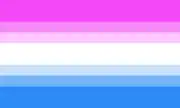Bi-curious
Bi-curious (sometimes Bicurious) is a term for a person, usually someone who is a self-identified heterosexual, who is curious or open about engaging in sexual activity with a person whose sex differs from that of their usual sexual partners.[1][2][3] The term is sometimes used to describe a broad continuum of sexual orientation between heterosexuality and bisexuality.[4] Such continuums include mostly heterosexual or mostly homosexual, but these can be self-identified without identifying as bisexual.[5] The terms heteroflexible and homoflexible are mainly applied to bi-curious people, though some authors distinguish heteroflexibility and homoflexibility as lacking the "wish to experiment with sexuality" implied by the bi-curious label. To sum it up, the difference between bisexual and bicurious is that bisexual people know that they are sexually attracted to both genders based on personal experience. Bicurious people are still maneuvering their way through their sexuality.[6][7]
| Sexual orientation |
|---|
.svg.png.webp) |
| Sexual orientations |
| Related terms |
| Research |
| Animals |
| Related topics |
|
| Part of a series on |
| LGBT topics |
|---|
|
|
| Flag | |
|---|---|
 {{{flag_name}}} |
Etymology
The term started becoming popular after 1984, according to Merriam-Webster, but The New Partridge Dictionary of Slang and Unconventional English and Oxford Dictionaries' Lexico claim that the term was coined in 1990.[8] According to Dictionary.com, the term was first used between 1980 and 1985.[9]
See also
References
- "Definition of BI-CURIOUS". www.merriam-webster.com. Retrieved 2019-09-21.
Characterized by an openness to or curiosity about having sexual relations with a person whose sex differs from that of one's usual sexual partners : curious about exploring or experimenting with bisexuality.
- Wilson G, Rahman Q (2008). Born Gay: The Psychobiology of Sex Orientation. Peter Owen. p. 15. ISBN 978-1784506636.
The term 'bi-curious' refers to that fact that many people who are basically straight might consider an occasional homosexual adventure simply to broaden their horizons.
- Holleb ML (2019). The A-Z of Gender and Sexuality: From Ace to Ze. Jessica Kingsley Publishers. p. 43. ISBN 978-1784506636.
Someone who considers themselves heterosexual but has a sexual or romantic 'curiosity' toward the same gender.
- Frank, Katherine (2008). "'Not Gay, but Not Homophobic': Male Sexuality and Homophobia in the 'Lifestyle'". Sexualities. 11 (4): 435–454. doi:10.1177/1363460708091743. S2CID 143060180.
- Savin-Williams, Ritch C.; Joyner, Kara; Rieger, Gerulf (2012). "Prevalence and Stability of Self-Reported Sexual Orientation Identity During Young Adulthood". Archives of Sexual Behavior. 41 (1): 103–110. doi:10.1007/s10508-012-9913-y. PMID 22302504. S2CID 43225099.
- Smorag, Pascale (14 May 2008). "From Closet Talk to PC Terminology: Gay Speech and the Politics of Visibility". Transatlantica (1). doi:10.4000/transatlantica.3503. Retrieved February 13, 2011.
- "What Is Bicurious?". WebMD. Retrieved 2022-02-19.
- "What Does It Mean To Be "Bi-Curious"?". Refinery29.
- "bi-curious". Dictionary.com. Retrieved 2022-04-02.